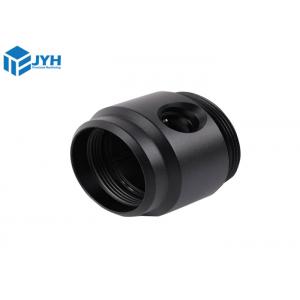

Add to Cart
CNC Machining Metal SS 304 Manufacturer And Shenzhen Milling Service Supplier
Our CNC milling process produces custom prototypes and end-use
production parts in as fast as 1 day.
We use 3-axis milling and 5-axis indexed milling processes to manufacture parts from more than 30 engineering-grade
plastics and metals.
Parts Certifications
ISO 9001:215 | AS9100D | ITAR Registered
Our CNC milling service is commonly used for:
Type and Tolerance parameters:
Type | Tolerance |
| Linear dimension | +/- 0.015 mm +/- 0.002 inch |
| Hole diameters (not reamed) | +/- 0.015 mm +/- 0.001 inch |
| Shaft diameters | +/- 0.015 mm +/- 0.001 inch |
| Part size limit | 950 * 650 *550 mm 36.0 * 21.5 * 21.5 inch |
Why Choose JYH Precision Machining Service
Bring your precision CNC machining parts to life through top-notch
precision machining services.
All prototypes and end-use parts meet strict quality standards and
tolerance requirements.
Our CNC precision machining combines advanced technology with
expert knowledge.
As an ISO 2768 and ISO 9001:13485 certified company, we prioritize
quality and ensure components meet specifications.
JYH boasts expert engineers ready to optimize your designs, cut
costs, and enhance quality.
Trust our team for exceptional advice and unmatched engineering
support, ensuring top-tier project results.
Experience our platform's advanced machine-learning, pinpointing
complex geometries for machining challenges.
Receive a detailed DFM analysis for your CNC parts in minutes.
At JYH CNC precision,our comprehensive equipment includes Precision
CNC milling, turning, and EDM.
From prototypes to mass production, we use top materials and
technology.
Our dedicated technicians work tirelessly for optimal product
quality.
Materials for CNC Milling Parts
Depending on your applications, our CNC milling process is
compatible with an extensive range of materials.
We stock over 30 production-grade metal alloys for producing
various CNC milled parts for different industries.
| Aluminum | Aluminum is a highly ductile metal, making it easy to machine. | Tolerances |
| Copper | Copper displays excellent thermal conductivity, electrical
conductivity and plasticity. It is also highly ductile, corrosion
resistant and can be easily welded. | ±0.125mm (±0.005″) |
| Stainless Steel | Stainless steel is the low carbon steel that offers many properties that are sought after for industrial applications. Stainless steel typically contains a minimum of 10% chromium by weight. | ±0.125mm (±0.005″) |
| Titanium | Titanium has a number of material properties that make it the ideal metal for demanding applications. These properties include excellent resistance to corrosion, chemicals and extreme temperatures. | ±0.125mm (±0.005″) |
Precision Machined Part Size Standards
Surface Finish on Milled Parts-Quick-turn Finishing
Our quality endure system
Payment method
Shipping way
After sales service
Our workshop
Frequently Asked Questions
1. What kinds of CNC milling machines does JYH CNC Precision
Machining have?
JYH works with vertical, horizontal, and multi-axis milling
machines.
The vertical milling machine is highly accurate equipment that
carries out 3-axis milling, suitable for vertical surfaces and
angular shapes.Our horizontal milling machines perform 4-axis
milling and are suitable for heavy milling operations. Our
multi-axis milling machines can move along different axes and cut
at various angles. They include 2-, 3-, 4-, and 5-axis CNC milling
machines.
2. Can I combine CNC milling with 3D Printing?
Yes, you can combine both manufacturing processes to reinforce your
custom parts. Printed parts can be milled to achieve dimensions
with tight tolerances or to meet surface quality requirements.
Intelligently combining these two methods can ensure faster
manufacturing,
less waste, and lower costs.
3. What are your CNC milling capabilities?
At JYH, we can produce highly complex and intricate rapid
prototypes and low-volume production parts.
The CNC milling process is suitable for a wide selection of
materials for various applications. Our CNC milling service can
achieve standard tolerances of +/- 0.05mm. However, tighter
tolerances of up to +/- 0.01mm are also possible.
4. What’s the difference between CNC milling and CNC lathe?
The major difference between CNC milling and CNC lathe is in their
machining process.
CNC milling involves rotating the cutting tools against a
stationary bar stock or workpiece.
In contrast, a CNC lather works by rotating the bar stock or
workpiece against a stationary tool.
CNC milling is more suitable for machining irregular and flat
surfaces, while CNC lathes work best for cylindrical or conical
parts.
JYH technology, Your Professional CNC Milling Manufacturing
Services Partner!
